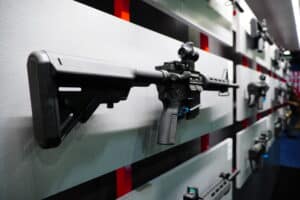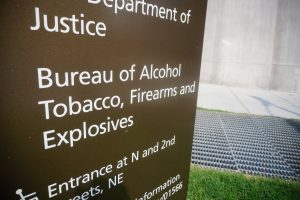People with concealed carry licenses in two more states will now be allowed to bypass background checks when they buy a gun.
On Wednesday, the Bureau of Alcohol, Tobacco, Firearms, and Explosives (ATF) announced gun carry permits from Michigan and Alabama now qualify as “Brady Permits.” That means when federally licensed gun dealers sell firearms to people with those permits, they don’t need to conduct a new check on the permittees. The change appears to be the result of President Donald Trump’s order to review federal gun policy and ends a years-long legal battle over the status of the states’ permits.
“ATF has issued updated guidance for Federal Firearms Licensees (FFL) on their obligations under the Brady Handgun Violence Prevention Act when transferring firearms to non-FFLs, including exceptions for certain state permits that can serve as alternatives to NICS background checks,” the agency wrote on social media.
The move is one of the first times that the Department of Justice (DOJ) and ATF have followed through on reversing a previous policy under Trump’s review. It will speed up the process of gun buying for some Americans with little risk of increasing crime since permit holders are vetted, including by a background check, during the application process.
The Brady Handgun Violence Prevention Act requires licensed dealers to conduct background checks on customers. But it includes an exception for those who have a licensee that meets certain criteria. Those licenses, which the ATF calls “Brady Permits,” must have been issued in the last five years, allow the permittee to possess guns, and state law requires the permit is “issued only after an authorized government official verified” the applicant can legally possess firearms.
Before the latest update, 28 states offered some kind of permit that the ATF determined fit that bill.
But that determination was not without controversy. Gun-rights activists have challenged the ATF’s interpretation of the requirements for years. For instance, Gun Owners of America (GOA) sued the ATF over Michigan’s gun-carry permit not being included back during the first Trump Administration.
The legal fight was ongoing when Trump won a delayed second term. But the dynamic changed a few months into Trump’s second term when he ordered the DOJ to reconsider its positions on a myriad of Second Amendment issues.
“Within 30 days of the date of this order, the Attorney General shall examine all orders, regulations, guidance, plans, international agreements, and other actions of executive departments and agencies (agencies) to assess any ongoing infringements of the Second Amendment rights of our citizens, and present a proposed plan of action to the President, through the Domestic Policy Advisor, to protect the Second Amendment rights of all Americans,” the order said.
While the review wasn’t finished within 30 days, it did eventually start to trickle down into DOJ legal filings–including in GOA’s Michigan suit. On April 1st, the DOJ asked for a delay in the case’s proceedings in order to re-evaluate its position.
“As a result of the change in agency leadership as well as the President’s Executive Order, ATF leadership has been conducting a more comprehensive review of the Bureau’s previous determinations regarding which state permits qualify as background check alternatives under Section 922(t)(3),” the department wrote in GOA v. DOJ. “That review—which includes, but is not limited to, review of the determination regarding Michigan’s concealed pistol license that is challenged in this case—is in its final stages, but the agency requires a small amount of additional time to complete it.”
On May 14th, the DOJ filed for a second extension. In that filing, DOJ said its “review is in its final stages” and “the parties have been engaged in discussions which may lead to the resolution of this case.” Now, the ATF has listed Michigan’s License to Conceal Carry and its License to Purchase, Carry, Possess, or Transport guns as qualifying Brady Permits alongside the Alabama Conceal Carry Permit and Conceal Carry Lifetime Permit.
“After five years of litigation against [DOJ], GOA just won two major victories on ‘Brady Alternates,'” the gun-rights group posted on social media.
Most permit holders in Michigan and Alabama will now have an easier time buying guns. However, gun dealers may still require them to go through a background check anyway.
“FFLs are not required to accept a qualifying alternate permit in lieu of a NICS background check,” the ATF said on its guidance website. “If the FFL has reason to believe that the permit is invalid, improperly issued, or otherwise does not meet the requirements of state or federal law, the FFL should contact NICS before transferring the firearm.”
The ATF’s recognition of the states’ permits goes into effect immediately.






